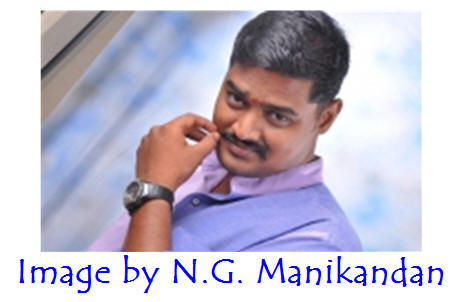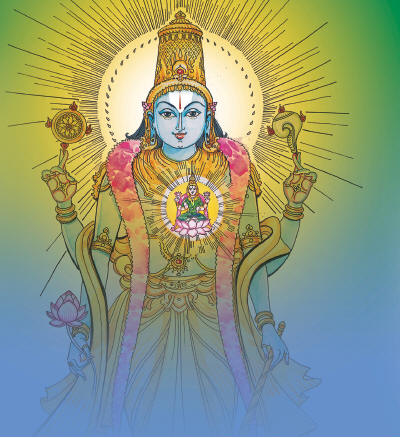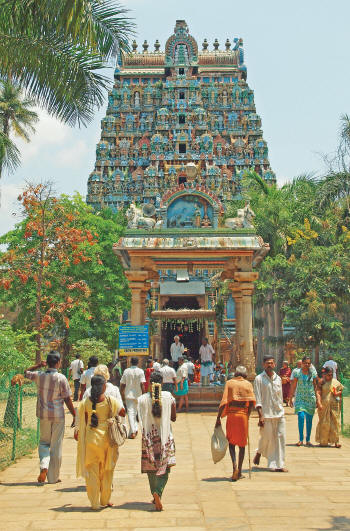
21Rangarajyam
Kamalavalli Merges with Arangan
Posted Date: January 15, 2019 Sakthi Vikatan
Author: Indira Saundarrajan
Image by N.G.Manikandan

One ministered asked her, “Is it proper to undergo hunger and self-imposed starvation in the name of rites, rituals, and worship?” She answered, “As the discoverer of the immortal God (=Amudhan = அமுதன்), possibly, I don’t have the hunger.” 2
Another minister told her, “How is it that you say things that contradict nature?” 3
Kamalavalli: “You said it right. The experience I had is contrary to nature. It is not something that happens to all. But this experience tells me that my recent life was not life at all, but the true life is the life yet to come. What will you say for that?” 4
She was never a big talker. She saw no one eye to eye and always had her eyes fixed to the ground. She as a princess knew only her father, Nandachōzan. That kind reserved and modest princess answering in clear and unequivocal terms made the ministers surprised. 5
Tiruvaraṅga Temple Vēthiyar came there upon invitation. Nandachōzan gave him a look that indicated to the Vēthiyar to tell him what happened at the temple (as he was a witness to the incident). 6
Tiruvaraṅga Temple Vēthiyar: “I am your servitor and the slave of Araṅgaṉ. My homage and respects to the Chola king. The princess had the unique boon to obtain Darśan of Araṅganātha-p-Perumāṉ’s youthful habiliment (= Yauvaṉa Kōlam). Because of it, the Darśan of Emperumāṉ’s upper garment was made possible for me. Devi princess’s boon is the result of her past-life meritorious deeds! Araṅgaṉ, it appears, wants the world to know something. Many people in their hearts and minds feel that this event was of that nature.” He finished his observations with humility. Nandachōzan, saying nothing, gave a quizzical look to the assembled people. 7

Tiruvaraṅga Temple Vēthiyar: “The king does not have to worry about this. It is certain that Araṅgaṉ having taken the princess into his graces will take you also likewise. He only brought to you the princess floating on the lotus flower in the pond. He only came in search and took into his graces the Lotus-child princess. The backdrop, which we the ordinary mortals do not understand, may have divine secrets. They will reveal themselves with time.” This opinion of the Vēthiyar sounded plausible to others. 8
Following this episode, days moved fast. The princess, as if she would see nothing other than Araṅga form, blindfolded her eyes except at the Pūja times. 9
King Nandachōzan: “Dear child! This is an oddity.” Kamalavalli: “This is not an oddity. To (the Divine) Father alone is my vow.” 10
The king: “Is that a vow?” 11
Kamalavalli talking in the third person: “Yes! Should not this girl join him who came from heaven to the earth and appeared before her eyes?” 12
The king: “Child! What are you talking about?” 13
Kamalavalli: “Father! This vow (blindfold) is about him. The vow is, my eyes having seen the Eternal God, will not see anything or anyone else. Why? It may be Tapas (austerity). He has to come down to grant grace for a vow or austerity.” 14
The king: “No matter what other people (interlocutor) ask or say, you give a gem of an answer and shut his mouth up. I see the effulgent flame of wisdom inside you. I don’t know how long you will remain in this condition. Is it possible for a girl (of human descent) to join a Devāthidēvaṉ (God of gods)? If it is true, he is the father of the father, he should understand the hardship of a father, that I am, and hurry up to put an end to your pursuit.” Nandachōzan cried with teary eyes. 15
His tears did not go to waste. That night, Araṅgaṉ appeared in his dream. 16
Araṅgaṉ: Nandā! Don’t be upset! Your daughter will attain me by devotion. Many Ṛṣis and Muṉis set examples before. Householders as exemplars of family values are needed. Besides, not that one can attain me by controlling his senses, I want to set an example that one can attain me with domestic life and with that goal in perspective, show the way by marrying your daughter. Where is the discriminatory delineation for me between humankind and divinity? 17
Araṅgaṉ: “My Sakthi (power) as the origin of all, will help them return to me by devotion. With that in mind and becoming your son-in-law, I desire to be Maṇavāḷaṉ (son-in-law), the resident deity in the temple in Uṛaiyūr and confer grace to all.” 18
Nandachōzan got up as the dream ended. He melted thinking about Araṅgaṉ becoming his son-in-law. That moment, the king considering himself as the father-in-law decided to return all the riches received (Araṅgan’s grace), back to Araṅgaṉ. Kamalavalli was ecstatic thinking of Araṅgan’s answer through her father’s dream. 19
The king moved all the gold out of the treasury as the dowry to Araṅgaṉ. He made gold-rice, gold-lentils, gold-vegetables on branches, and gold-vegetables on the vine as the gold gift on a plethora of plates. He deployed an array of 100 select auspicious girls to carry the gold-laden plates. He arranged for his divine daughter to ride in the howdah on an elephant. The king himself rode on a twelve-horse-drawn chariot behind his daughter to Tiruvaraṅgam. 20
The Tiruvaraṅga sanctum sanctorum was open. Kamalavalli carrying a garland transformed into a flame, shone on Araṅgan’s divine chest for a few seconds and subsided inside him. Then, it was the beginning of a rising and sky-rending roar of ‘Raṅgā, Raṅgā.’ 21

That was a wonderful sight. It was an ecstatic sight. 22
It was not after death, but when alive, this event became a great example, because of higher devotion, of a person attaining merger with Araṅgaṉ. 23
Following this merger, Nandachōzan spent all his wealth for Araṅgaṉ. He built a temple in Uraiyur and a second sanctum for Araṅgaṉ with the divine moniker Azhagiyamaṇavāḷaṉ (beautiful Groom). He also constructed a sanctum in the name of Kamalavalli Thāyār (Mother Kamalavalli), though she was his daughter and because she, considered as Mahalakshmi, merged with Māl (Vishnu, Araṅgaṉ) 24
The king established the custom of festival of the marriage-merger of his daughter Kamalavalli with the groom, Tiruvaraṅgaṉ as Azhagiya Maṇavāḷaṉ on the precise day he found her as an infant in the 12th month of Paṅkuṉi (பங்குனி = Phalguna = mid-March to mid-April) under the auspicious Nakshatra Ayilyam (Āshleṣā = the Embrace; the 9th Lunar mansion). 25
Among humans, wedded life is superior. The practice of controlling the senses, and performing Tapas (austerity) to extricate oneself from the clutches of Karma is not for everyone. The celebration of the divine wedding as a festival is to exemplify and glorify the wedded life and its Dharmas as the channel for reaching and merging with Araṅgaṉ. As a memorial to the king, a circumambulatory path around the temple was named Azhagiya Maṇavāḷa Rājamahēndiraṉ divine street. This event in the history of Tiruvaraṅgam became a great fillip for Bakthi Mārga (Devotional path). 26
Devotional path and pursuit grew in popularity. Just as the trees grow tall and luxuriant, dry leaves fall in abundance. Likewise, there was a concurrent growth of irreligious activities (with the rise of devotion). 27
That is the nature of Kaliyuga! Qualities like lust, anger, jealousy, and selfishness became the ministers of the Kali Puruṣa (the man of Kali age) and led this world astray. The preciousness of shade is appreciated in the scorching sun. As the power of sweltering sun burns the body, the Sakthi of the inimical qualities caused unhappiness to all. 28
People were subjected to the ravages by the great elements (Earth, water, fire, air, and either) periodically. Natural disasters like tsunami, riverine floods…afflicted the people. Time does not stop for anyone. The time machine kept on spinning. Uraiyūr Temple and Tiruvaraṅgam suffered from nature’s outbursts and anger. The kings did their best to renovate and rejuvenate the temple.
The kings realized that when the temples flourished, the people prospered. The kings regarded the Araṅgaṉ Temple as greater than their own lives and nurtured and safeguarded it. 30
One among them was a Chera Nādu king Thidavirathaṉ. Afflicted with sadness due to lack of progeny, it made him significantly involved with the service to the temple. 31
No action without reason! 32
Yet to come.
Indira Saundarrajan – Image: N.G. Manikandan
255-204-204